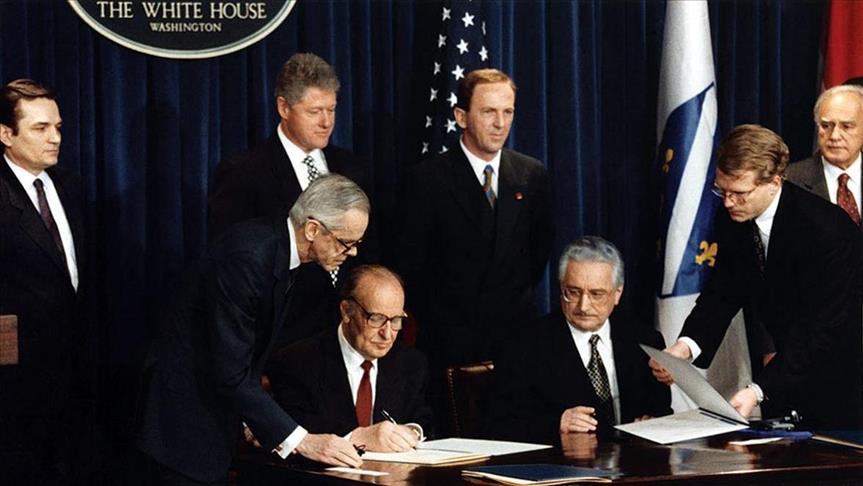Bosnia's 20-year division under Dayton accords
Although agreement brought peace it has served to fortify divisions, impede progress

Sırbistan
By Talha Ozturk
BELGRADE, Serbia
Twenty years on since the Dayton peace agreement ended the war in Bosnia-Herzegovina, the deal is viewed as having cemented divisions in the country and created political deadlock.
The accords, initiated at the Wright-Patterson U.S. Air Force base near Dayton, Ohio, on Nov. 21, 1995, ended a brutal ethnic war in Bosnia that resulted in around 100,000 deaths over three-and-a-half years.
The capital Sarajevo was left in ruins after a siege that lasted nearly four years -- longer than the war itself by the time Serb forces left their positions -- and became the symbol of the war’s savagery.
The Dayton agreement was signed by Serbian President Slobodan Milosevic, Bosnia’s Alija Izetbegovic and Croatian leader Franjo Tudjman after three weeks of negotiations.
However, by agreeing to divide Bosnia into two separate entities largely based on the territories held by the warring sides at the time, the agreement arguably set the scene for entrenched ethnic division and political impasse.
The accords established the Federation of Bosnia-Herzegovina -- inhabited mostly by Croats and Bosnian Muslims, or Bosniaks -- and the Republika Srpska for Bosnian Serbs, as well as Brcko, a neutral, self-governing canton.
This hybrid political establishment has led to the country of 4 million people being governed by five presidents, 13 prime ministers and 136 ministers over the last two decades.
“This is not a fair peace but better than continuation of the war,” Izetbegovic said after signing the agreement.
Speaking to Anadolu Agency, Miro Lazovic, chairman of the Bosnian assembly during the war, said he never understood how the concept of a Serbian republic within Bosnia emerged from Dayton.
“During the council meetings I conducted, we did not take such a decision,” he said. “I do not understand [how] Republika Srpska got into the Dayton [agreement].”
U.S. negotiator Richard Holbrooke advocated a Serb entity to bring about peace but many observers fear it has mainly served to divide the country and slow progress. In areas such as EU accession, the complex relationship between the entities make it difficult to agree on necessary reform.
The fragmented nature of Bosnia remains one of the central complaints of ordinary Bosnians.
“The main objective of the accords was to end the war,” former journalist Adijata Ziga Borovac said. “Its goal was not to create a functional state. Moreover, the structure is one of the biggest factors blocking the country's development and progress towards EU membership.”
Anadolu Agency website contains only a portion of the news stories offered to subscribers in the AA News Broadcasting System (HAS), and in summarized form. Please contact us for subscription options.



